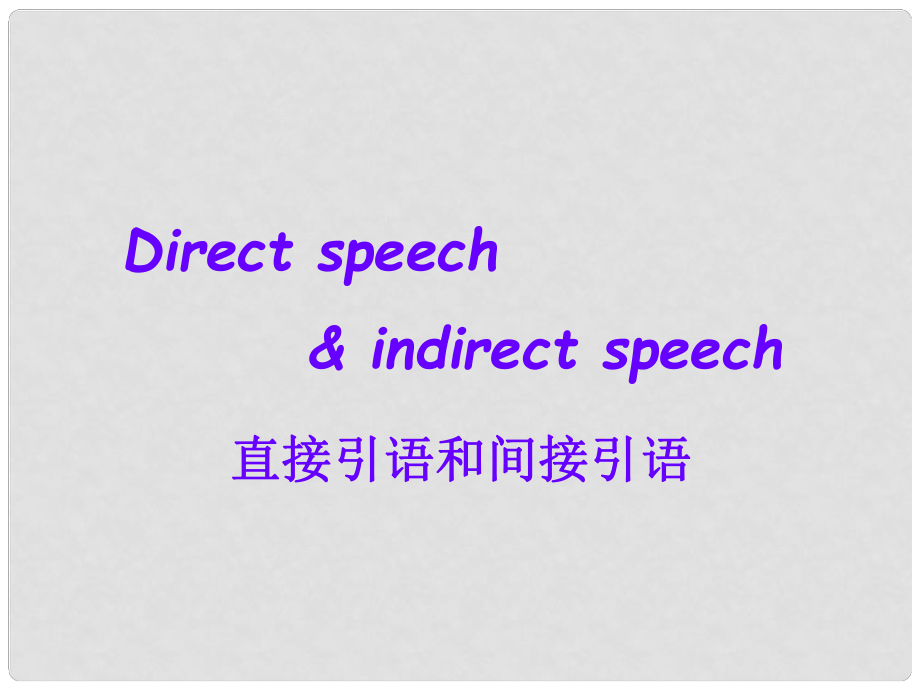《浙江省安吉縣高一英語(yǔ)《Unit 1Friendship》直接引語(yǔ)和間接引語(yǔ) 課件》由會(huì)員分享�����,可在線閱讀�,更多相關(guān)《浙江省安吉縣高一英語(yǔ)《Unit 1Friendship》直接引語(yǔ)和間接引語(yǔ) 課件(14頁(yè)珍藏版)》請(qǐng)?jiān)谘b配圖網(wǎng)上搜索。
1����、Direct speech 直接引語(yǔ)和間接引語(yǔ)直接引語(yǔ)和間接引語(yǔ)& indirect speechMr. Black said, “Im busy.” (直接引語(yǔ))直接引語(yǔ))Mr. Black said that he was busy.” (間接引語(yǔ))間接引語(yǔ))直接引語(yǔ)與間接引語(yǔ)直接引語(yǔ)與間接引語(yǔ)由直接引語(yǔ)變?yōu)殚g接引語(yǔ)需注意的三個(gè)變化由直接引語(yǔ)變?yōu)殚g接引語(yǔ)需注意的三個(gè)變化人稱變化人稱變化時(shí)態(tài)變化時(shí)態(tài)變化狀語(yǔ)變化(時(shí)間狀語(yǔ)和地點(diǎn)狀狀語(yǔ)變化(時(shí)間狀語(yǔ)和地點(diǎn)狀語(yǔ))語(yǔ))指示代詞的變化指示代詞的變化動(dòng)詞的變化動(dòng)詞的變化陳述句陳述句直接引語(yǔ)若為陳述句,變?yōu)殚g接引語(yǔ)時(shí)�,間接引語(yǔ)往往變直接引語(yǔ)若為陳
2、述句���,變?yōu)殚g接引語(yǔ)時(shí)�����,間接引語(yǔ)往往變成由從屬連詞成由從屬連詞that(在口語(yǔ)中可省略)引導(dǎo)(在口語(yǔ)中可省略)引導(dǎo)的賓語(yǔ)從句�����,的賓語(yǔ)從句��,引述引述動(dòng)詞常用動(dòng)詞常用say����、tell等注意等注意:可以說(shuō)可以說(shuō)said that, said to sb that, told sb that,不可直接說(shuō)�,不可直接說(shuō)told that )。從句����。從句中的中的人稱�����、時(shí)態(tài)�����、指示代詞����、時(shí)間狀語(yǔ)���、地點(diǎn)狀語(yǔ)人稱、時(shí)態(tài)�����、指示代詞����、時(shí)間狀語(yǔ)、地點(diǎn)狀語(yǔ)等都等都要作相應(yīng)的變化要作相應(yīng)的變化He said, “I have been to the Great Wall. ” He said to us that he had
3���、 been to the Great Wall. He said, “Ill give you an examination next Monday. ” He _ he would give us an examination the next Monday. said to me/ told me that1. 注意時(shí)態(tài)的變化注意時(shí)態(tài)的變化 1) 1) 如主句的謂語(yǔ)動(dòng)詞是現(xiàn)在時(shí)或?qū)?lái)時(shí)���,直接引語(yǔ)如主句的謂語(yǔ)動(dòng)詞是現(xiàn)在時(shí)或?qū)?lái)時(shí),直接引語(yǔ)變?yōu)殚g接引語(yǔ)時(shí)�,從句的時(shí)態(tài)不需變化。變?yōu)殚g接引語(yǔ)時(shí)�,從句的時(shí)態(tài)不需變化。He says, He wants to be a singer.He says,
4�、He wants to be a singer.He says that he wants to be a singer.He says that he wants to be a singer.如主句是一般過(guò)去時(shí),直接引語(yǔ)變?yōu)殚g接引語(yǔ)時(shí)����,如主句是一般過(guò)去時(shí)���,直接引語(yǔ)變?yōu)殚g接引語(yǔ)時(shí),從句的謂語(yǔ)動(dòng)詞必須是與過(guò)去相關(guān)的時(shí)態(tài)�。從句的從句的謂語(yǔ)動(dòng)詞必須是與過(guò)去相關(guān)的時(shí)態(tài)。從句的謂語(yǔ)動(dòng)詞時(shí)態(tài)變化如下:謂語(yǔ)動(dòng)詞時(shí)態(tài)變化如下:一般現(xiàn)在時(shí)一般現(xiàn)在時(shí)一般過(guò)去時(shí)一般過(guò)去時(shí) 一般將來(lái)時(shí)一般將來(lái)時(shí)過(guò)去將來(lái)時(shí)過(guò)去將來(lái)時(shí) 現(xiàn)在進(jìn)行時(shí)現(xiàn)在進(jìn)行時(shí)過(guò)去進(jìn)行時(shí)過(guò)去進(jìn)行時(shí) 現(xiàn)在完成時(shí)現(xiàn)在完成時(shí)過(guò)去完成時(shí)過(guò)去完成時(shí) 過(guò)去完成時(shí)不變過(guò)
5����、去完成時(shí)不變Tina said, I usually get up at six. Martin told me, I rang Alice yesterday. Nina told me, Lisa is studying abroad. Nell said, I have worked out this problem. Tina said that she usually got up at six.Martin told me that he had rang Alice the day before.Nina told me that Lisa was studying abroad
6、.Nell said that she had worked out that problem.2. 注意人稱變化注意人稱變化�,指示代詞指示代詞,時(shí)間狀語(yǔ)����,地,時(shí)間狀語(yǔ)���,地點(diǎn)狀語(yǔ)和動(dòng)詞的變化點(diǎn)狀語(yǔ)和動(dòng)詞的變化指示代詞指示代詞 thist that, thesethose, , 時(shí)間狀語(yǔ)時(shí)間狀語(yǔ)nowthen, todaythat day, this weekthat week, yesterdaythe day before, last weekt the week before ,four days agofour days before ,the day before yesterday
7、two days before ,tomorrowthe next day, next monththe next month. .地點(diǎn)狀語(yǔ)地點(diǎn)狀語(yǔ)herethere 動(dòng)詞的變化動(dòng)詞的變化comego, bringt takeHe said, I like it very much.Toby said to me, This is the School Computer Center.The boy said, I put all the things there.My sister asked me, Could you bring the chairs upstairs��?He said t
8�、hat he liked it very much.Toby said to me that that was the School Computer Center.The boy said that I put all the things there.My sister asked me if I could take the chairs upstairs.注意:直接引語(yǔ)變間接引語(yǔ)時(shí),以下情況時(shí)態(tài)不需變化�。注意:直接引語(yǔ)變間接引語(yǔ)時(shí),以下情況時(shí)態(tài)不需變化�����。1. 1. 直接引語(yǔ)表述的是客觀真理直接引語(yǔ)表述的是客觀真理, ,諺語(yǔ)、格言諺語(yǔ)�、格言The geography teacher to
9、ld us that the sun rises in the east and sets in the west.My father told me that a friend in needMy father told me that a friend in need is is a a friend indeed.friend indeed.2. 直接引語(yǔ)帶有具體的過(guò)去時(shí)間狀語(yǔ)直接引語(yǔ)帶有具體的過(guò)去時(shí)間狀語(yǔ) He said that his He said that his father father was born was born in 1995.in 1995.3. 直接引語(yǔ)中有
10���、情態(tài)動(dòng)詞直接引語(yǔ)中有情態(tài)動(dòng)詞should, would, could, had better, might, must, need��,used toused to等等He told me that I He told me that I had better had better get up early.get up early.4 4. 當(dāng)直接引語(yǔ)中有以當(dāng)直接引語(yǔ)中有以when, while引導(dǎo)的從句�,表示過(guò)去的引導(dǎo)的從句�����,表示過(guò)去的時(shí)間時(shí)時(shí)間時(shí) He told me that he was watching TV when he He told me that he was watchin
11�����、g TV when he came in.came in.三疑問(wèn)句三疑問(wèn)句如果直接引語(yǔ)是疑問(wèn)句�����,變?yōu)殚g接引語(yǔ)時(shí)�,要把疑問(wèn)句如果直接引語(yǔ)是疑問(wèn)句,變?yōu)殚g接引語(yǔ)時(shí),要把疑問(wèn)句語(yǔ)序變?yōu)殛愂鼍湔Z(yǔ)序語(yǔ)序變?yōu)殛愂鼍湔Z(yǔ)序( (即主語(yǔ)在謂語(yǔ)的前面即主語(yǔ)在謂語(yǔ)的前面)1 1)一般疑問(wèn)句一般疑問(wèn)句 間接引語(yǔ)用連詞間接引語(yǔ)用連詞whether或或if引導(dǎo)�����,原引導(dǎo)�����,原主句中謂語(yǔ)動(dòng)詞主句中謂語(yǔ)動(dòng)詞said要改為要改為asked(me/him/us等等)����,疑問(wèn)句,疑問(wèn)句語(yǔ)序語(yǔ)序變?yōu)樽優(yōu)殛愂鼍涞恼Z(yǔ)序陳述句的語(yǔ)序 He said, “Do you have any difficulty with pronunciation?
12�����、” He asked (me) whether/if I had any difficulty with my pronunciation. He said, “A Are y you interested in English?” He _i_interested in English. asked if I was2)特殊疑問(wèn)句特殊疑問(wèn)句 原來(lái)的疑問(wèn)詞作為間接引語(yǔ)的原來(lái)的疑問(wèn)詞作為間接引語(yǔ)的連詞���,主句的謂語(yǔ)動(dòng)詞用連詞�,主句的謂語(yǔ)動(dòng)詞用ask(sb. )來(lái)表達(dá)����,疑問(wèn)來(lái)表達(dá)�,疑問(wèn)句句語(yǔ)序改為陳述句語(yǔ)序語(yǔ)序改為陳述句語(yǔ)序 He said to me,“Whats your name?” He a
13�、sked me what my name was. He asked us, “How many car factories have been built in your country?” He asked us how many car factories had been built in our country.3)選擇疑問(wèn)句)選擇疑問(wèn)句 用用whetheror表達(dá)�����,而不用表達(dá)��,而不用ifor�,也不用���,也不用eitheror He asked, “Do you speak English or French?” He asked me whether I spoke English
14���、or French. 當(dāng)堂檢測(cè)案:把下列直接引語(yǔ)改為間接引語(yǔ)當(dāng)堂檢測(cè)案:把下列直接引語(yǔ)改為間接引語(yǔ)1He said: “Ive left my book in my room.”2She said: “He will be busy.” 3She said to Tom, “Can you help me?”4She asked, “Is this book yours or his?”5The teacher asked, “how did you repair it?”He said that he had left his book in his room.She said that he would be busy.She said to Tom whether I could help him.She asked whether that book was mine or his.The teacher asked how I had repaired it.
 浙江省安吉縣高一英語(yǔ)《Unit 1Friendship》直接引語(yǔ)和間接引語(yǔ) 課件
浙江省安吉縣高一英語(yǔ)《Unit 1Friendship》直接引語(yǔ)和間接引語(yǔ) 課件

